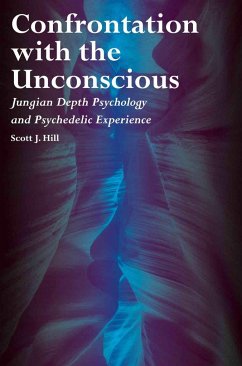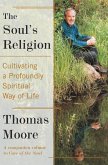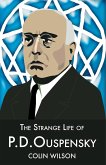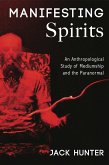- Broschiertes Buch
- Merkliste
- Auf die Merkliste
- Bewerten Bewerten
- Teilen
- Produkt teilen
- Produkterinnerung
- Produkterinnerung
An exploration of the use the of psychedelics and Jung's work on trauma, the shadow, psychosis, and psychospiritual transformation.
Andere Kunden interessierten sich auch für
![Walking Shadows Walking Shadows]() Tim ReadWalking Shadows33,99 €
Tim ReadWalking Shadows33,99 €![Touched by Nature Touched by Nature]() Pip WallerTouched by Nature27,99 €
Pip WallerTouched by Nature27,99 €![The Soul's Religion The Soul's Religion]() Thomas MooreThe Soul's Religion17,99 €
Thomas MooreThe Soul's Religion17,99 €![The Ways of the Soul The Ways of the Soul]() Andrew PowellThe Ways of the Soul28,99 €
Andrew PowellThe Ways of the Soul28,99 €![Conversations with the Soul Conversations with the Soul]() Andrew PowellConversations with the Soul34,99 €
Andrew PowellConversations with the Soul34,99 €![The Strange Life of P.D.Ouspensky The Strange Life of P.D.Ouspensky]() Colin WilsonThe Strange Life of P.D.Ouspensky25,99 €
Colin WilsonThe Strange Life of P.D.Ouspensky25,99 €![Manifesting Spirits Manifesting Spirits]() Jack HunterManifesting Spirits46,99 €
Jack HunterManifesting Spirits46,99 €-
An exploration of the use the of psychedelics and Jung's work on trauma, the shadow, psychosis, and psychospiritual transformation.
Hinweis: Dieser Artikel kann nur an eine deutsche Lieferadresse ausgeliefert werden.
Hinweis: Dieser Artikel kann nur an eine deutsche Lieferadresse ausgeliefert werden.
Produktdetails
- Produktdetails
- Verlag: Aeon Books Ltd
- Seitenzahl: 250
- Erscheinungstermin: 30. Juni 2019
- Englisch
- Abmessung: 231mm x 152mm x 15mm
- Gewicht: 396g
- ISBN-13: 9781913274023
- ISBN-10: 1913274020
- Artikelnr.: 62214071
- Herstellerkennzeichnung
- Libri GmbH
- Europaallee 1
- 36244 Bad Hersfeld
- gpsr@libri.de
- Verlag: Aeon Books Ltd
- Seitenzahl: 250
- Erscheinungstermin: 30. Juni 2019
- Englisch
- Abmessung: 231mm x 152mm x 15mm
- Gewicht: 396g
- ISBN-13: 9781913274023
- ISBN-10: 1913274020
- Artikelnr.: 62214071
- Herstellerkennzeichnung
- Libri GmbH
- Europaallee 1
- 36244 Bad Hersfeld
- gpsr@libri.de
Scott J. Hill, Ph.D., lives in Sweden, where he conducts scholarly research on the intersection between psychedelic studies and Jungian psychology. He holds degrees in psychology from the University of Minnesota and in philosophy and religion from the California Institute of Integral Studies.
Preface
Acknowledgments
Part 1: Encountering the Unconscious
Chapter 1: Jung's Confrontation with the Unconscious and Its Relation to
Psychedelic Experience
Psychedelic Research and Theory: A Brief History
Jung, Jungians, and Psychedelic Experience
Chapter 2: Psychedelic-Enhanced Psychotherapy
Psycholytic and Psychedelic Models
Psycholytic Therapy
Psychedelic Therapy
Common Features and Goals
Schools of Psychedelic-Enhanced Therapy
Psychoanalytic
Grofian
Shamanic
Hybrid
An Early Jungian Approach to Psychedelic-Enhanced Psychotherapy
Chapter 3: Basic Jungian Concepts and Principles
Consciousness and the Unconscious
The Relationship between Consciousness and the Unconscious
Individuation
Archetypes and Their Manifestation in the Psyche
Dreams and Other Symbolic Products of the Unconscious
Chapter 4: Jung's Explanation of Psychedelic Experience
A Lowering of the Threshold of Consciousness
The Limits of Integration
Ronald Sandison's Response to Jung's Criticism
Part 2: Jungian Insights into Difficult Psychedelic Experiences
Chapter 5: Psychedelic Experience and Trauma
Difficult Psychedelic Experiences as Potentially Traumatic
Psychedelic-Induced Trauma
Psychedelic-Enhanced Therapy as Treatment for Past Trauma
The Relation of Trauma in Jungian Psychology to Psychedelic Experience
Kalsched's Model of the Psyche's Archetypal Self-Care System
Trauma and Dissociation in Jung's Psychology
Trauma and Jung's Theory of the Complex
Possession by Complexes in Relation to Archaic Psychological Defenses
The Emergence of Trauma-Based Imagery in Psychedelic Experience
Chapter 6: Psychedelic Experience and the Shadow
The Shadow in Jung's Psychology
Personal and Archetypal Levels of the Shadow
The Overwhelmingly Numinous Nature of the Archetypal Psyche
Resistance to and Projection of the Shadow
The Shadow in Psychedelic Experience
Chapter 7: Psychedelic Experience and Psychosis
Psychosis and Psychotic States
Psychedelics as Psychosis-Inducing Substances
From the Psychotomimetic to the Psychedelic Paradigm
The Psychotomimetic Model Reconsidered
Transpersonal Explanations of Psychedelic-Induced Psychotic States
Chapter 8: Psychosis in Jung's Psychology
Jung's Focus on Schizophrenic Forms of Psychosis
Commonalities between Schizophrenia and Other Conditions
Neurosis, Latent Psychosis, and Manifest Psychosis
Reduced Consciousness and Psychedelic-Induced Psychotic States
Accounts of Psychedelic-Induced Psychotic States
Chapter 9: Psychedelic Experience and Transformation
The Transformative Potential of Psychedelic Experiences
The Transformative Potential of Psychotic States
The Transformative Potential of Psychedelic-Induced Psychotic States
Chapter 10: A Jungian Approach to the Transformative Potential of Difficult
Psychedelic Experiences
Jung on the Healing Potential of Psychotic Experiences
The Painful Passage through the Shadow towards Wholeness
Treating Trauma: Integration Versus Abreaction in Jung's Psychology
Jung's Definitions of Trauma and Abreaction
Grof's View of Abreaction
Jung's Critique of Abreaction
Drawing from Both Grof and Jung
The Transformative Potential of Psychedelic-Enhanced Psychotherapy: Two
Case Studies
Dr. Rick Strassman's Report
Dr. Margot Cutner's Report
Part 3: Jung's Psychology and Psychedelic-Enhanced Psychotherapy
Chapter 11: The Transcendent Function: Jung's Approach to Integration
Chapter 12: Jungian Psychotherapy
The Method and Purpose of Psychotherapy
Gaining Access to the Unconscious
Coming to Terms with the Unconscious
The Relationship between Analyst and Patient
The Analyst
The Dialectical Relationship
The Transference
Dreams and Their Interpretation
The Sphere of the Irrational
The Purpose and Value of Dreams
The Compensating Function of Dreams
Chapter 13: Implications for Psychedelic-Enhanced Psychotherapy
Subject Readiness
The Therapist and the Dialectical Relationship
The Compensating Function
The Significance of the Collective Unconscious
Integration and the Role of Ego-Consciousness
Conclusion
Notes
Bibliography
Index
Acknowledgments
Part 1: Encountering the Unconscious
Chapter 1: Jung's Confrontation with the Unconscious and Its Relation to
Psychedelic Experience
Psychedelic Research and Theory: A Brief History
Jung, Jungians, and Psychedelic Experience
Chapter 2: Psychedelic-Enhanced Psychotherapy
Psycholytic and Psychedelic Models
Psycholytic Therapy
Psychedelic Therapy
Common Features and Goals
Schools of Psychedelic-Enhanced Therapy
Psychoanalytic
Grofian
Shamanic
Hybrid
An Early Jungian Approach to Psychedelic-Enhanced Psychotherapy
Chapter 3: Basic Jungian Concepts and Principles
Consciousness and the Unconscious
The Relationship between Consciousness and the Unconscious
Individuation
Archetypes and Their Manifestation in the Psyche
Dreams and Other Symbolic Products of the Unconscious
Chapter 4: Jung's Explanation of Psychedelic Experience
A Lowering of the Threshold of Consciousness
The Limits of Integration
Ronald Sandison's Response to Jung's Criticism
Part 2: Jungian Insights into Difficult Psychedelic Experiences
Chapter 5: Psychedelic Experience and Trauma
Difficult Psychedelic Experiences as Potentially Traumatic
Psychedelic-Induced Trauma
Psychedelic-Enhanced Therapy as Treatment for Past Trauma
The Relation of Trauma in Jungian Psychology to Psychedelic Experience
Kalsched's Model of the Psyche's Archetypal Self-Care System
Trauma and Dissociation in Jung's Psychology
Trauma and Jung's Theory of the Complex
Possession by Complexes in Relation to Archaic Psychological Defenses
The Emergence of Trauma-Based Imagery in Psychedelic Experience
Chapter 6: Psychedelic Experience and the Shadow
The Shadow in Jung's Psychology
Personal and Archetypal Levels of the Shadow
The Overwhelmingly Numinous Nature of the Archetypal Psyche
Resistance to and Projection of the Shadow
The Shadow in Psychedelic Experience
Chapter 7: Psychedelic Experience and Psychosis
Psychosis and Psychotic States
Psychedelics as Psychosis-Inducing Substances
From the Psychotomimetic to the Psychedelic Paradigm
The Psychotomimetic Model Reconsidered
Transpersonal Explanations of Psychedelic-Induced Psychotic States
Chapter 8: Psychosis in Jung's Psychology
Jung's Focus on Schizophrenic Forms of Psychosis
Commonalities between Schizophrenia and Other Conditions
Neurosis, Latent Psychosis, and Manifest Psychosis
Reduced Consciousness and Psychedelic-Induced Psychotic States
Accounts of Psychedelic-Induced Psychotic States
Chapter 9: Psychedelic Experience and Transformation
The Transformative Potential of Psychedelic Experiences
The Transformative Potential of Psychotic States
The Transformative Potential of Psychedelic-Induced Psychotic States
Chapter 10: A Jungian Approach to the Transformative Potential of Difficult
Psychedelic Experiences
Jung on the Healing Potential of Psychotic Experiences
The Painful Passage through the Shadow towards Wholeness
Treating Trauma: Integration Versus Abreaction in Jung's Psychology
Jung's Definitions of Trauma and Abreaction
Grof's View of Abreaction
Jung's Critique of Abreaction
Drawing from Both Grof and Jung
The Transformative Potential of Psychedelic-Enhanced Psychotherapy: Two
Case Studies
Dr. Rick Strassman's Report
Dr. Margot Cutner's Report
Part 3: Jung's Psychology and Psychedelic-Enhanced Psychotherapy
Chapter 11: The Transcendent Function: Jung's Approach to Integration
Chapter 12: Jungian Psychotherapy
The Method and Purpose of Psychotherapy
Gaining Access to the Unconscious
Coming to Terms with the Unconscious
The Relationship between Analyst and Patient
The Analyst
The Dialectical Relationship
The Transference
Dreams and Their Interpretation
The Sphere of the Irrational
The Purpose and Value of Dreams
The Compensating Function of Dreams
Chapter 13: Implications for Psychedelic-Enhanced Psychotherapy
Subject Readiness
The Therapist and the Dialectical Relationship
The Compensating Function
The Significance of the Collective Unconscious
Integration and the Role of Ego-Consciousness
Conclusion
Notes
Bibliography
Index
Preface
Acknowledgments
Part 1: Encountering the Unconscious
Chapter 1: Jung's Confrontation with the Unconscious and Its Relation to
Psychedelic Experience
Psychedelic Research and Theory: A Brief History
Jung, Jungians, and Psychedelic Experience
Chapter 2: Psychedelic-Enhanced Psychotherapy
Psycholytic and Psychedelic Models
Psycholytic Therapy
Psychedelic Therapy
Common Features and Goals
Schools of Psychedelic-Enhanced Therapy
Psychoanalytic
Grofian
Shamanic
Hybrid
An Early Jungian Approach to Psychedelic-Enhanced Psychotherapy
Chapter 3: Basic Jungian Concepts and Principles
Consciousness and the Unconscious
The Relationship between Consciousness and the Unconscious
Individuation
Archetypes and Their Manifestation in the Psyche
Dreams and Other Symbolic Products of the Unconscious
Chapter 4: Jung's Explanation of Psychedelic Experience
A Lowering of the Threshold of Consciousness
The Limits of Integration
Ronald Sandison's Response to Jung's Criticism
Part 2: Jungian Insights into Difficult Psychedelic Experiences
Chapter 5: Psychedelic Experience and Trauma
Difficult Psychedelic Experiences as Potentially Traumatic
Psychedelic-Induced Trauma
Psychedelic-Enhanced Therapy as Treatment for Past Trauma
The Relation of Trauma in Jungian Psychology to Psychedelic Experience
Kalsched's Model of the Psyche's Archetypal Self-Care System
Trauma and Dissociation in Jung's Psychology
Trauma and Jung's Theory of the Complex
Possession by Complexes in Relation to Archaic Psychological Defenses
The Emergence of Trauma-Based Imagery in Psychedelic Experience
Chapter 6: Psychedelic Experience and the Shadow
The Shadow in Jung's Psychology
Personal and Archetypal Levels of the Shadow
The Overwhelmingly Numinous Nature of the Archetypal Psyche
Resistance to and Projection of the Shadow
The Shadow in Psychedelic Experience
Chapter 7: Psychedelic Experience and Psychosis
Psychosis and Psychotic States
Psychedelics as Psychosis-Inducing Substances
From the Psychotomimetic to the Psychedelic Paradigm
The Psychotomimetic Model Reconsidered
Transpersonal Explanations of Psychedelic-Induced Psychotic States
Chapter 8: Psychosis in Jung's Psychology
Jung's Focus on Schizophrenic Forms of Psychosis
Commonalities between Schizophrenia and Other Conditions
Neurosis, Latent Psychosis, and Manifest Psychosis
Reduced Consciousness and Psychedelic-Induced Psychotic States
Accounts of Psychedelic-Induced Psychotic States
Chapter 9: Psychedelic Experience and Transformation
The Transformative Potential of Psychedelic Experiences
The Transformative Potential of Psychotic States
The Transformative Potential of Psychedelic-Induced Psychotic States
Chapter 10: A Jungian Approach to the Transformative Potential of Difficult
Psychedelic Experiences
Jung on the Healing Potential of Psychotic Experiences
The Painful Passage through the Shadow towards Wholeness
Treating Trauma: Integration Versus Abreaction in Jung's Psychology
Jung's Definitions of Trauma and Abreaction
Grof's View of Abreaction
Jung's Critique of Abreaction
Drawing from Both Grof and Jung
The Transformative Potential of Psychedelic-Enhanced Psychotherapy: Two
Case Studies
Dr. Rick Strassman's Report
Dr. Margot Cutner's Report
Part 3: Jung's Psychology and Psychedelic-Enhanced Psychotherapy
Chapter 11: The Transcendent Function: Jung's Approach to Integration
Chapter 12: Jungian Psychotherapy
The Method and Purpose of Psychotherapy
Gaining Access to the Unconscious
Coming to Terms with the Unconscious
The Relationship between Analyst and Patient
The Analyst
The Dialectical Relationship
The Transference
Dreams and Their Interpretation
The Sphere of the Irrational
The Purpose and Value of Dreams
The Compensating Function of Dreams
Chapter 13: Implications for Psychedelic-Enhanced Psychotherapy
Subject Readiness
The Therapist and the Dialectical Relationship
The Compensating Function
The Significance of the Collective Unconscious
Integration and the Role of Ego-Consciousness
Conclusion
Notes
Bibliography
Index
Acknowledgments
Part 1: Encountering the Unconscious
Chapter 1: Jung's Confrontation with the Unconscious and Its Relation to
Psychedelic Experience
Psychedelic Research and Theory: A Brief History
Jung, Jungians, and Psychedelic Experience
Chapter 2: Psychedelic-Enhanced Psychotherapy
Psycholytic and Psychedelic Models
Psycholytic Therapy
Psychedelic Therapy
Common Features and Goals
Schools of Psychedelic-Enhanced Therapy
Psychoanalytic
Grofian
Shamanic
Hybrid
An Early Jungian Approach to Psychedelic-Enhanced Psychotherapy
Chapter 3: Basic Jungian Concepts and Principles
Consciousness and the Unconscious
The Relationship between Consciousness and the Unconscious
Individuation
Archetypes and Their Manifestation in the Psyche
Dreams and Other Symbolic Products of the Unconscious
Chapter 4: Jung's Explanation of Psychedelic Experience
A Lowering of the Threshold of Consciousness
The Limits of Integration
Ronald Sandison's Response to Jung's Criticism
Part 2: Jungian Insights into Difficult Psychedelic Experiences
Chapter 5: Psychedelic Experience and Trauma
Difficult Psychedelic Experiences as Potentially Traumatic
Psychedelic-Induced Trauma
Psychedelic-Enhanced Therapy as Treatment for Past Trauma
The Relation of Trauma in Jungian Psychology to Psychedelic Experience
Kalsched's Model of the Psyche's Archetypal Self-Care System
Trauma and Dissociation in Jung's Psychology
Trauma and Jung's Theory of the Complex
Possession by Complexes in Relation to Archaic Psychological Defenses
The Emergence of Trauma-Based Imagery in Psychedelic Experience
Chapter 6: Psychedelic Experience and the Shadow
The Shadow in Jung's Psychology
Personal and Archetypal Levels of the Shadow
The Overwhelmingly Numinous Nature of the Archetypal Psyche
Resistance to and Projection of the Shadow
The Shadow in Psychedelic Experience
Chapter 7: Psychedelic Experience and Psychosis
Psychosis and Psychotic States
Psychedelics as Psychosis-Inducing Substances
From the Psychotomimetic to the Psychedelic Paradigm
The Psychotomimetic Model Reconsidered
Transpersonal Explanations of Psychedelic-Induced Psychotic States
Chapter 8: Psychosis in Jung's Psychology
Jung's Focus on Schizophrenic Forms of Psychosis
Commonalities between Schizophrenia and Other Conditions
Neurosis, Latent Psychosis, and Manifest Psychosis
Reduced Consciousness and Psychedelic-Induced Psychotic States
Accounts of Psychedelic-Induced Psychotic States
Chapter 9: Psychedelic Experience and Transformation
The Transformative Potential of Psychedelic Experiences
The Transformative Potential of Psychotic States
The Transformative Potential of Psychedelic-Induced Psychotic States
Chapter 10: A Jungian Approach to the Transformative Potential of Difficult
Psychedelic Experiences
Jung on the Healing Potential of Psychotic Experiences
The Painful Passage through the Shadow towards Wholeness
Treating Trauma: Integration Versus Abreaction in Jung's Psychology
Jung's Definitions of Trauma and Abreaction
Grof's View of Abreaction
Jung's Critique of Abreaction
Drawing from Both Grof and Jung
The Transformative Potential of Psychedelic-Enhanced Psychotherapy: Two
Case Studies
Dr. Rick Strassman's Report
Dr. Margot Cutner's Report
Part 3: Jung's Psychology and Psychedelic-Enhanced Psychotherapy
Chapter 11: The Transcendent Function: Jung's Approach to Integration
Chapter 12: Jungian Psychotherapy
The Method and Purpose of Psychotherapy
Gaining Access to the Unconscious
Coming to Terms with the Unconscious
The Relationship between Analyst and Patient
The Analyst
The Dialectical Relationship
The Transference
Dreams and Their Interpretation
The Sphere of the Irrational
The Purpose and Value of Dreams
The Compensating Function of Dreams
Chapter 13: Implications for Psychedelic-Enhanced Psychotherapy
Subject Readiness
The Therapist and the Dialectical Relationship
The Compensating Function
The Significance of the Collective Unconscious
Integration and the Role of Ego-Consciousness
Conclusion
Notes
Bibliography
Index








